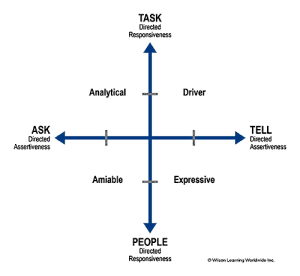Social styles: why are they important?
Social style can be very important for many reasons. Firstly, we must look at what social styles are.
Social style refers to the mindset of the individual which can in-turn predict how they will behave. The social styles model created by Tracom sets out 4 main social styles:
Analytical
Individuals with an analytical style are more likely to be:
- Focused on the tasks rather than people
- A ‘thinker’
- Prefers to work alone
- Careful when making decisions
Driver
People with a driver mindset are more likely to be:
- Competitive
- Goal-oriented
- Fast-paced
- Making efforts to control
Amiable
Individuals with an amiable social style are more likely to be:
- Relationship-oriented
- Slower in making decisions
- Seeking respect and avoiding conflict
- Good working in teams
Expressive
People with an expressive mindset are more likely to be:
- Creative
- Good at interacting with others
- Fast-paced
- Unconcerned by routine

What you may be asking is: why are social styles important to me?
An understanding of social styles can be applied to many areas of society including: in a team, a classroom, and communication.
In a team
Firstly, understanding social styles are useful if you are part of a group, particularly a leader such as a manager. Once you understand your group’s social styles, you will be able to co-ordinate your team in an optimal way. For example, if you know that one of your team members has an expressive social style, you may assign them to a task which allows them to be creative.

In a classroom
Are you a teacher? Being aware of your pupil’s social style means that you can teach in a way which caters to their individual style. For example, if a child has a driver style, you may put learning in the form of a game with an incentive for winning. By appealing to an individual’s social style, you increase the likelihood that they will become and remain engaged in learning.
Social style refers to the mindset of the individual which can in-turn predict how they will behave.
In communication
By understanding social styles, we not only have the ability to recognise social styles in others, but we can also have the ability to modify our own social style to appeal to the individual we are interacting with. For example, if you recognise that someone has an amiable style, you may put more focus on your relationship with them. Not only will this make you more compatible but it increases the chance that you will gain the trust of the individual. This can be particularly useful in jobs where you work with other people, for example counsellor or social worker.
By being aware of social styles, we are able to be flexible in different aspects of interacting with people, for example through recognising others’ social styles and adapting to them.











